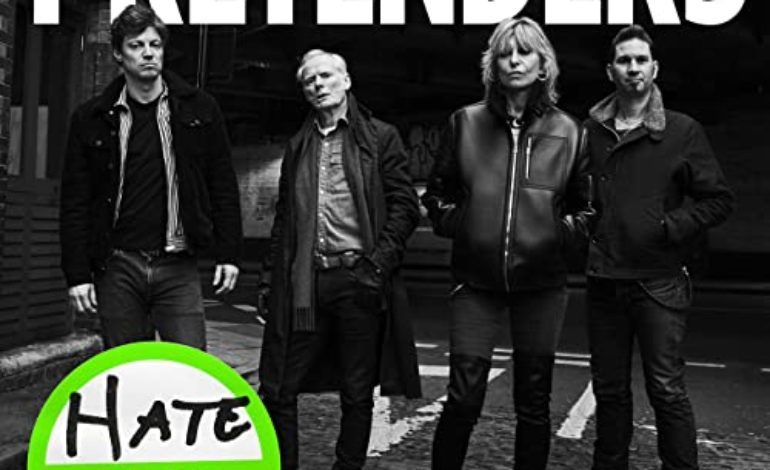

Rock has been punked, again
Clouded by cigarette smoke in an ill-lit basement, punk rock fills the void of fans who press the stage front. Years later, the music is considered too rebellious, or perhaps too aggressive for more sensitive listeners. Some consider punk to have died, however, it lives on in pieces in the year 2020.
Bending the traditionality of new wave rock music, The Pretenders’ new album Hate For Sale is spiked with punk to make an original sonic palette. Since their beginning in the late ‘70s as saviors of guitar-based rock, The Pretenders have forged a fresher sound for the next generation. Guitarist and lead vocalist Chrissie Hynde transcend once again the stereotypical rock sound with heavenly vocals and spider-like guitar riffs. With her magnetism and long-time bass player Nick Wilkinson’s rhythmic ecstasy, this album has a track for every listener.
The Pretenders first released “The Buzz” as a preview to this album in March, as their first new track since 2016. It is a twangy ballad about a love affair with a swooning rush of guitar licks, and a wonderful preview of the rest of the tracks in Hate For Sale. The energy in this song is very similar in “Maybe Love Is In NYC” with its romanticized guitar riffs and rhythm. Though both have the band’s charisma in every note.
But in contrast to these lovelorn ballads is the punk Hynde wants to infuse, which is heard on the track “Hate For Sale.” This song is precisely dated to post-punk tracks of the late ’80s but rocks hard and fast. Heart-racing drumming from Martin Chambers strikes people’s ear hair and calls to the rebel inside everyone. Chambers’ electrifying drums also hit home in “I Did Not Know When To Stop,” in which Hynde’s guitar is welded with every tap of the drumstick. With a little more soul, a harmonica adds the emotion needed to take this song forward.
As an ode to rebel rock perhaps, “Junkie Walk” is an indulgence for mischief and rebellion. Heavy distortion is the heart of this track, with the soulful vocals from Hynde and full guitar accompaniment. A filthy solo to lead the outro is Hynde’s specialty, putting out the rebellious flame this song started. “Turf Accountant Daddy” has an identical aura, with a bit more heart and harmony the entire band wants to project.
With the sound of a pop-rock hit, “Didn’t Want To Be This Lonely” is perhaps their top charts song, with a vibrant melody unmatched by other pop-rock sensations. Though this song resonates with some of their album, it seems like a black sheep for the band with little creativity in each instrument’s sound. Though Hynde’s solo is nothing but spectacular to add to this song.
Turning the speed down a bit is the track “Lightning Man.” Almost reggae-rock in nature, this ominous ballad haunts the album and will make people sway with the soft guitar and lingering vocals. Another song which lingers is “You Can’t Hurt A Fool.” With a more romantic tune, Hynde’s vocals take listeners to heaven and back with lust and perhaps a slow dance. This song plays on the emotional aspect of the band, with a sound similar to their self-named 1980 debut album Pretenders. As a final track, “Crying In Public” is a shameful song with heart-throbbing piano and elegant vocals. The track is gentle, and a sensitive journey to end the album.
The Pretenders are nothing if not brilliant. Their consistent output of soulful and edgy rock proves their ability to remain relevant in a new century. The band is rooted in their own past, which only makes their music better in quality, which is proven well in Hate For Sale.
